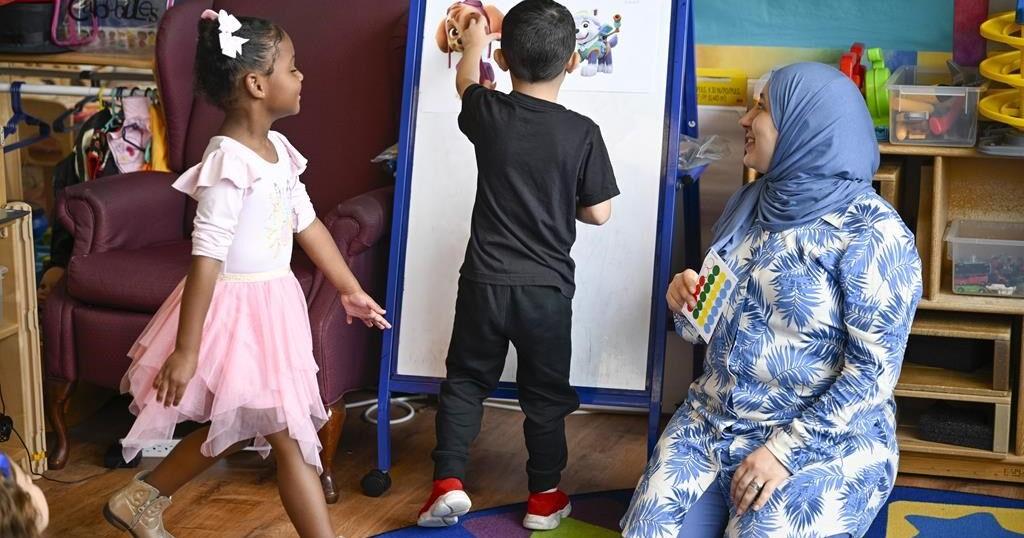ANNANDALE, Va. (AP) — As lawmakers voted on a budget deal at the U.S. Capitol, a different kind of balloting was taking place a dozen miles away in a sun-filled Virginia preschool classroom. At stake: which animated dog was the best character on the cartoon “PAW Patrol.”
In a heated primary, the 3-and-4-year-old students in room 14 at the ACCA Child Development Center had narrowed it down to two finalists: Chase, a German shepherd who wears a police uniform, and Skye, who wears a pink “pup pack” and is a favorite among girls in the class. The children cast votes by scrawling their names in crayon beneath pictures of the two characters. By mid-morning, it was a dead heat: five votes to five.
Benejas Abeselome, 4, put his name down for Chase.
“Police take bad guys,” Benejas said. “I wanted police because I like policing.”
It will be years before these youngsters vote in a real election, but ACCA is one of many preschools around the country that have been starting students early on civics education. The goal is nothing short of raising good citizens and strengthening democracy.
At this age, children are not learning about the three branches of government or how a bill becomes a law. Teachers are working with them on how to solve problems with classmates, how to deal with anger or disappointment without being hurtful and how to think about others’ needs. These are lessons, teachers say, that can be difficult to draw from grown-up politicians — especially during a vitriolic campaign season.
“We’re all here to help develop these children to become better citizens … to be better problem-solvers and to be better equipped socially, emotionally,” said Mary Folks, a teacher at the school. “Because once they have a handle on that, I feel like things they accomplish and things they do will have a better impact on this world.”
The most important civics lesson preschools can impart is “social democracy,” said Dan Gartrell, an early education expert. His book on teaching preschoolers about democracy, “Education for a Civil Society,” is used by ACCA and other preschools.
It “starts with appreciating each member of the group as a worthy member and worthy of expressing thoughts and ideas,” Gartrell said. From there, he said, children can learn to treat their peers with kindness, resolve conflicts and negotiate difficult situations without using hurtful words.
Engaging with toddlers in ways that make them feel their voice matters is important groundwork, said Rachel Robertson, the chief academic officer for Bright Horizons, which runs more than 1,000 preschool centers globally and embraces democratic ideals in its early education approach.
Around ages 3 or 4, a child is “starting to be a real community member and contributing to the classroom community and thinking a little bit broader about the world,” Robertson said.
At ACCA, like many preschools, youngsters are given a lot of autonomy. There are hours dedicated to free play. Children get to vote on what they study and eat: A classroom had just finished studying sand because children were curious about it after summer beach trips. And students get to sample apples and vote on which variety the school will order.
It’s all intended to affirm to children that their thoughts are valuable — along with those of their classmates. On this Thursday, they all were thinking about “PAW Patrol.”
In Room 11, 3-year-old Jade, who donned pink sneakers that lit up when she stepped, explained why she was backing Skye.
“I like her helicopter,” Jade said. “I like that she saves everybody.”
In Room 13, teachers created ballots in English and Spanish. When they asked the class who had won the election, one boy confidently piped up: “Me!”
Many of the preschool’s students represent the first generation of their families born in the United States. María-Isabel Ballivian, the preschool’s executive director, said she looks for ways to remind them they are American, even if their families don’t speak English and only recently arrived from other countries. For one, she throws a large Fourth of July gathering.
“If we give them now that sense of belonging, that’s going to be a tool that they will have to become resilient once they face discrimination,” Ballivian said.
Ballivian said many politicians could learn something from coming back to preschool — things like how to weather disappointment and how to think about the well-being of people who are unlike them.
“I don’t see how we can change the adults,” Ballivian said. “But I do know, if we work hard, we can prepare our children for a better future.”
Back in room 14, there was an important development. Another student named Janet had cast her ballot, writing her name under Skye’s photo with a backwards ‘J.’ The students counted the votes aloud. Skye emerged victorious.
___
Associated Press journalists Nathan Ellgren and Almaz Abedje contributed to this article.
___
The Associated Press’ education coverage receives financial support from multiple private foundations. AP is solely responsible for all content. Find AP’s standards for working with philanthropies, a list of supporters and funded coverage areas at AP.org.
